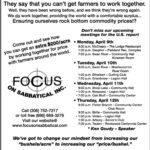The following is a lightly edited letter of response sent from the National Farmers Union to Michael Ferguson, Canada’s auditor general. We would like to clarify that the National Farmers Union is not asking for an audit of G3; our request is for an audit of the Canadian Wheat Board (CWB) as it prepared for









